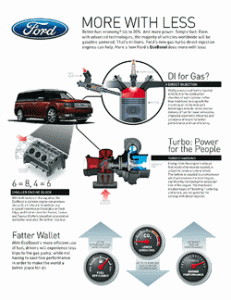Today the Environmental Protection Agency (EPA) and the Department of Energy (DOE) signed a joint final rule that establishes greenhouse gas emission standards and corporate fuel economy standards for light duty vehicles for model years 2012-2016. This National Fuel Efficiency Policy requires passenger cars and light trucks to get an overall average of 35.5 miles per gallon (mpg) by 2016 while cars are expected to average 39 mpg and trucks will be required to get 30 mpg. According to the current administration, this measure is expected to save 1.8 billion barrels of oil over the life of the program.
However, we could actually reduce oil imports and emissions even more under this program by using ethanol.
Let me explain. The easiest way to gain the improved fuel economy is through “engine downsizing,” in other words, using smaller engines. But the new smaller engine technologies will not mean less power, like in the past. According to Ethanol Boosting Systems, their technology enables gasoline engines to “reach their full potential” by utilizing performance enhancing properties of ethanol in conjunction with advances in direct injection (DI) and turbocharging.
Here is how their system works: The EBS approach uses controlled direct ethanol injection to add a very significant vaporization-enhanced On-Demand Octane BoostTM that essentially removes the knock limit on engine performance. The elimination of the knock constraint has been proven by systematic engine dynamometer tests. This allows a small gasoline engine to provide the same or higher torque as compared to a conventional engine of much larger size.
This downsizing, the company explains, when combined with the use of a high compression ratio enables gas engines to improve efficiency, aka fuel economy, by 25-30 percent. The ethanol blend deriving the best results is E85 and in conjunction with a 3-way catalytic converter for emission control, you achieve both goals: decreased emissions and increased fuel economy. In other words, octane matters and the highest octane level you can purchase today, is E85.
 Several auto companies are already heading in this direction. Ford has released several cars with its “Ecoboost Engines” and plans on adding more models to the line-up. Volkswagon and Mazda and Saab are already on their way and Ricardo, Inc., best known for their engine work in motorsports, is working on their version of this technology called the Ethanol Boosted Direct Injection (EBDI).
Several auto companies are already heading in this direction. Ford has released several cars with its “Ecoboost Engines” and plans on adding more models to the line-up. Volkswagon and Mazda and Saab are already on their way and Ricardo, Inc., best known for their engine work in motorsports, is working on their version of this technology called the Ethanol Boosted Direct Injection (EBDI).
In a company statement, Ricardo President Dean Harlow said, “The EBDI engine project is a great example because it turns the gasoline-ethanol equation upside down. It has the performance of a diesel at the cost of a gasoline engine, and runs on ethanol, gasoline or a blend of both.”
The ultimate key to this technology is that the engines must be tuned to run most efficiently on ethanol, not gasoline as they currently are. To make this a reality, several things must happen in tandem.
- 1. Auto manufacturers must produce cars using this “flex-fuel” technology that capitalizes on the higher blends of ethanol. This will take additional investment and research dollars but the results will pay off. This process can also be accelerated by passing a national mandate that all cars sold in the U.S. must be flex-fuel vehicles.
- 2. The EPA needs to approve the E15 Waiver, allowing consumers with conventional vehicles the opportunity to use up to 15 percent ethanol in their fuel blend. At the same time, consumers need to voice their support of biofuels by purchasing them at the pump.
- 3. More funds need to be allocated to building the infrastructure for higher blends in the form of blender pumps and E85 pumps.
- 4. The government must not deviate from its path as set out in the Renewable Fuels Standard which is leading the way to ending our dependence on foreign oil through the use of domestically produced renewable fuels.
When consumers, retailers, auto manufacturers, and the government begin to work together, our country will achieve its goals of energy and financial security and environmental sustainability.


